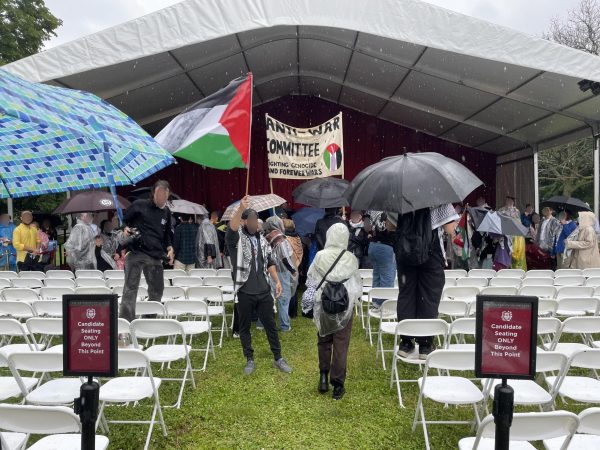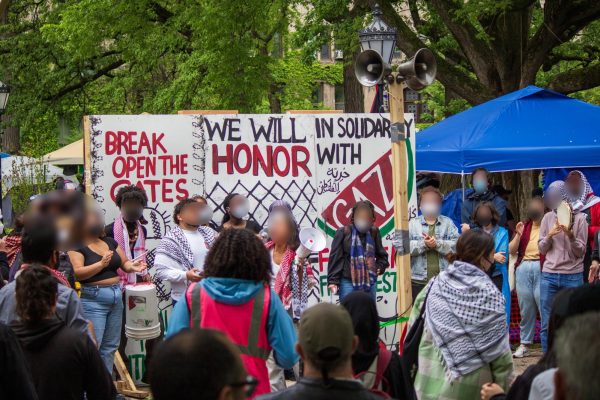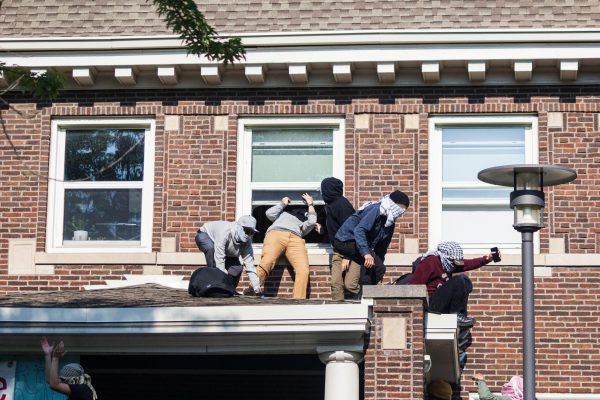UChicago Alum Dinah Clottey’s T’kor Couture Brings Together Social Justice and Fashion
Clottey, who graduated last June, is the founder and owner of fashion brand T’kor Couture, which released its new line on November 4.
Aerial shot of campus in the Fall.
January 7, 2023
T’kor Couture, the hand-crocheted, social justice–oriented fashion line started by University alum (B.A./B.S. ’22) Dinah Clottey, released its new collection on November 4. The price range for her latest collection runs from $60.00 for bucket hats to $365.00 for a cardigan, with prices for tops and skirts around $120.00 and $155.00, respectively.
Clottey launched T’kor Couture in 2020 during the COVID-19 pandemic, but her history with crocheting goes back to nearly a decade before.
“I learned to crochet when I was about 12 years old,” Clottey said in an interview with The Maroon. “[My mom] wanted me to learn so I could teach her. That’s the only reason I started crocheting in the first place. It was definitely something I would just get in and out of. I never took it too seriously, and, once I was able to teach my mom, I kind of just dropped it.”
But over time, Clottey crocheted as a way to destress. Her hobby helped her navigate the isolation and upheaval of the COVID-19 pandemic and eventually led her to create T’kor Couture.
“During the pandemic, [there] was also this push for the fight for Black Lives. I just felt very stuck in my room. I’m a very shy person, so I didn’t know how to express a lot of the emotions and thoughts that were going on in my mind at the time, and crocheting was one of those ways where I felt like I could express that,” Clottey said about the beginning stages of T’kor.
Clottey wanted to create fashion that added to discussions about social justice in an accessible and hopeful manner.
“I created my page where I would be designing things, and I would talk on some social issues. But I didn’t want to be adding to the heaviness that everybody was feeling. Kind of like how crocheting was an outlet that made me feel better, I wanted to showcase my designs and let that be a place where people can also feel lighter,” Clottey said.
Clottey studied sociology at the University of Chicago, and her plan after college was originally to become a lawyer. In the 1950s and 60s, fashion played a large role in the Civil Rights Movement, whether through the leather jackets of the Black Panthers or the tailored suits of Martin Luther King Jr. Clottey’s collection is no exception. She takes cues from the 1960s, particularly from Soul Style, in her designs.
Her work also takes inspiration from novels and the work of social justice advocates such as Jean-Michel Basquiat, Ntozake Shange, and W.E.B. Du Bois, usually featuring a pattern or design centered on a theme from one of their works. The logo for her brand, a crown, comes from Basquiat’s art, which often featured crowns on historical and important Black figures. Clottey’s younger sister, Cherith, an artist herself, designed the logo for T’kor.
Clottey’s new “Twoness Collection” was inspired by Du Bois’s idea of “Double Consciousness,” which her website describes as “the struggle AfricanAmericans face to remain true to Black culture while at the same time conforming to the dominant white society.”
The Twoness Collection’s checkerboard pattern, coming in either yellow and white or purple and white, expresses these two ideas, Clottey said.
“I’m utilizing colors to represent this duality of existence, but instead of trying so hard to separate them or to choose one, [the collection is] embracing all parts of our identities and embracing all of the intersections that we embody,” Clottey said about the designs of her new line.
Despite the opportunities that growth might bring, Clottey hopes to keep T’kor Couture’s identity as a small enterprise.
“I want it to be big, but I also still want it to be small. I still love the craft of it all being handmade, it being something that you take your time with that isn’t heavily producing a lot of products,” Clottey said. “The fashion industry is one of the highest contributors to our climate crisis with the amount of waste that it produces as well as the materials it uses when they make clothing.”
Clottey never intended to go into the fashion industry, but her advice for those who do is simply to get started.
“It is scary. It is nerve wracking. You’re not gonna get everything right. It’s gonna take a very long time before you feel as if you have the right tools in your arsenal, but I think having the willingness to start and then also finding others that can be in your corner [is important],” Clottey said. “Ever since I’ve started collaborating with more people and getting people to help me out, I feel like it’s been a much smoother process, and it’s been more fun.”













